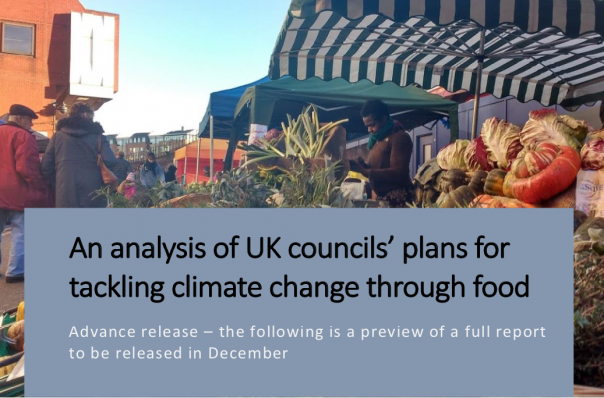
In fact, only 13 out of 92 such plans (14%) contain proposals to tackle food emissions at the scale that is needed, despite the fact that the food and farming sector creates between 20% and 30% of greenhouse gas emissions.
Ruth Westcott, climate change campaign coordinator at Sustain, said: “It is great that the Prime Minister plans to put significant investment into tackling climate change, but tackling food-related emissions including nature-friendly farming and supporting good diets must be as high up the agenda as phasing out diesel cars.
“Our research shows that action isn't happening quickly enough through local authorities and government must see councils as an opportunity to improve this in way that benefits communities and improves people's lives, whether that’s restoring traditional orchards in flood-risk areas, freeing up land for urban fringe farming, serving local, seasonal and sustainable food in their local services or supporting a thriving local food high street.
“This action needs to become widespread and commonplace.”
This week marks what would have been the International Conference of the Parties in Glasgow (COP26), which has been postponed for a year following the Covid-19 pandemic, and Prime Minister Boris Johnson has today announced the Government's latest plans for tackling climate change.
Westcott said that the new Sustain research shows that without more action, the UK risks failing to meet international commitments to keep global warming within 1.5 degrees Celsius, and achieving net zero.
“Local councils have the opportunity to radically reduce the impact of local food systems and normalise climate-friendly diets through the food they serve in schools, care services, local institutions and at events.
“As significant landowners, councils can influence sustainable food growing, and improve the behaviour of local businesses and citizens,” she said
The Sustain report recommends that government works much more closely with local government to channel investment funding to improve local food according to local priorities, to help government achieve its net zero target in a way that benefits local communities and helps to level up communities across the country.
So far, 300 councils (74%) in the UK have declared a climate and nature emergency; acknowledging an urgent crisis and committing to taking steps to address it, with 92 publishing a strategy to set out how to do this.
As part of the research all 92 publicly available action plans were analysed for how comprehensively they include plans to tackle food-related greenhouse gas emissions.
Of those analysed, only 13 include significant actions across a breadth of issues to address food-related emissions, meaning that the vast majority of councils - even though most have declared a climate and nature emergency - are not tackling food in a way needed to achieve net zero, or indeed restore biodiversity, halt deforestation and prevent antimicrobial resistance.
Farming and fishing, transport, food processing and waste is responsible for 20%-30% of greenhouse gas emissions globally.
The report says that our diets and farming practices combined are probably the greatest overall threat to the health of our planet because they carry a major risk factor for future zoonotic diseases (the SARS-CoV-2 virus behind Covid-19 is strongly suspected to be one), as well as being a leading driver of habitat loss and antibiotic resistance.
The research identified the following councils to be among the leaders in plans to tackle food-related emissions: Bristol City, Camden, Cornwall County, Durham County, East Lothian, Enfield, Hounslow, Lewisham, Middlesbrough, Stockport, Stroud Town, Somerset West & Taunton, and Southwark.